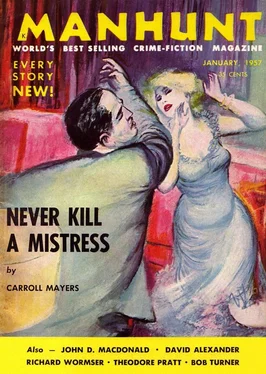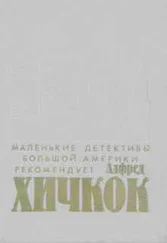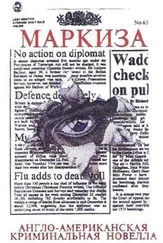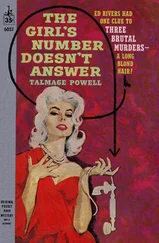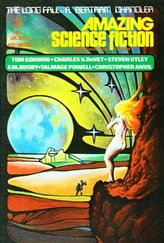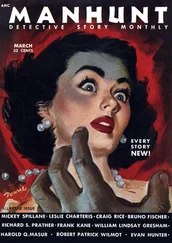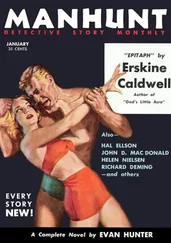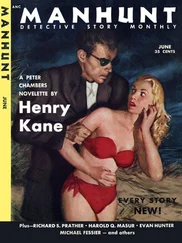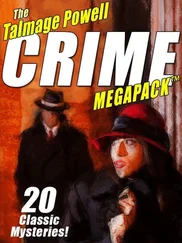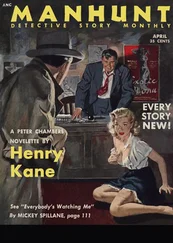Тэлмидж Пауэлл - Manhunt. Volume 5, Number 1, January, 1957
Здесь есть возможность читать онлайн «Тэлмидж Пауэлл - Manhunt. Volume 5, Number 1, January, 1957» весь текст электронной книги совершенно бесплатно (целиком полную версию без сокращений). В некоторых случаях можно слушать аудио, скачать через торрент в формате fb2 и присутствует краткое содержание. Город: New York, Год выпуска: 1957, Издательство: Flying Eagle Publications, Жанр: Детектив, на английском языке. Описание произведения, (предисловие) а так же отзывы посетителей доступны на портале библиотеки ЛибКат.
- Название:Manhunt. Volume 5, Number 1, January, 1957
- Автор:
- Издательство:Flying Eagle Publications
- Жанр:
- Год:1957
- Город:New York
- ISBN:нет данных
- Рейтинг книги:4 / 5. Голосов: 1
-
Избранное:Добавить в избранное
- Отзывы:
-
Ваша оценка:
- 80
- 1
- 2
- 3
- 4
- 5
Manhunt. Volume 5, Number 1, January, 1957: краткое содержание, описание и аннотация
Предлагаем к чтению аннотацию, описание, краткое содержание или предисловие (зависит от того, что написал сам автор книги «Manhunt. Volume 5, Number 1, January, 1957»). Если вы не нашли необходимую информацию о книге — напишите в комментариях, мы постараемся отыскать её.
Manhunt. Volume 5, Number 1, January, 1957 — читать онлайн бесплатно полную книгу (весь текст) целиком
Ниже представлен текст книги, разбитый по страницам. Система сохранения места последней прочитанной страницы, позволяет с удобством читать онлайн бесплатно книгу «Manhunt. Volume 5, Number 1, January, 1957», без необходимости каждый раз заново искать на чём Вы остановились. Поставьте закладку, и сможете в любой момент перейти на страницу, на которой закончили чтение.
Интервал:
Закладка:
All he saw was his own face reflected in the mirror on the wall.
Smart Sucker
by Richard Wormser
Gwen’s fingers worked up and down Henry’s thigh ecstatically. “Let's bump Henry off,” she said. “We don’t need him any more.”
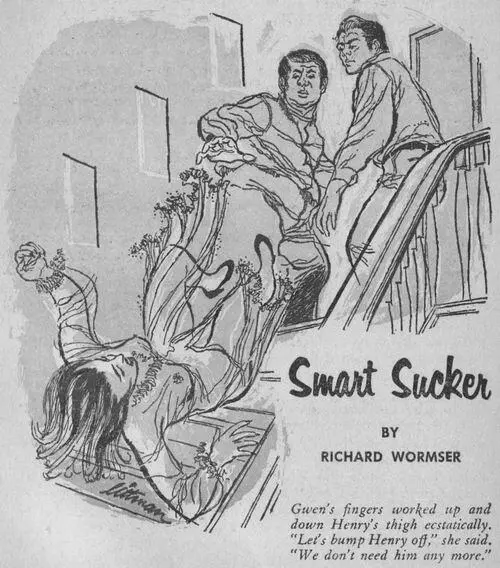
He went, a guy determined to make two more calls before the end of office hours, along the dark and dirty street. Torn newspapers and empty cigarette packages skittered along the gutter, and a lean black cat, not quite mangy, scuttled up a narrow alleyway.
When he raised his head to see if he was anywhere near number 1262, the Merser Printing Company, the damp wind caught the brim of his new hat and he slapped a quick hand on the crown to hold it down. The wind was strong enough to make the briefcase in his other hand a problem.
His name was Henry Croft, he sold office supplies, and he believed that hard work, a neat appearance and attention to his customers’ individual needs would some day make him rich. He had a wife, one and seven-ninths children, lived in the suburbs — though not in as good a house as he someday hoped to own — and was generally considered a pretty good guy.
He did not belong in a place like this Slack Street except to pass through, selling a few typewriter ribbons and maybe a filing case or two. Which was why he was here.
Now, raindrops began to fall, big, idle ones that rolled in the dust of Slack Street without breaking. A frugal guy, he thought first of the new hat, the newly-pressed suit. He stepped into a doorway.
Then the rain changed, became the kind in which the drops are small and driven hard; the lasting kind of rain. He shifted the briefcase to his other hand and looked around.
Through unwashed windows neon ads for a couple of breweries shone at him from across the street. A bar, but one so lowly that it didn’t have a name — just BAR & GRILL in letters that might have been born gilt on a once-black background.
Waiting for the wind to slacken for a second, he made the dash across the street toward the neon.
As he made it into the bar, the wind took the heavy door away from him and slammed it shut. He gave the apologetic smile of an intruder.
Nobody smiled back at him.
There were six people in the bar, counting the bartender; four men, two women. Or rather, four boys and two girls; all of them had the unlined faces of the early twenties, despite their late-forty eyes.
Bubbles chased themselves endlessly around the brightly-lit rim of the juke box, out of rhythm with the rock-and-roll number that was playing.
Henry Croft laid his briefcase on a stool, wiped it with his handkerchief and then carefully placed his hat on the dried surface. He told the bartender: “Scotch on the rocks.”
The bartender gave his dark hair an unnecessary slicking with both palms, and said: “I don’t read you, Mac.”
“Scotch whiskey and ice. No water, no soda.”
“Whyn’t you say so?”
Henry Croft perched himself on the stool next to his hat and case. The young man on his right smelled slightly sweaty and more than slightly pomaded. The girl beyond him languidly pulled up her skirt and scratched a dead white thigh. The bartender slapped an old-fashioned glass in front of Henry Croft and waited for a dollar bill; he threw a quarter back in exchange.
The wind shifted and rain slashed viciously against the windows.
The scotch had never crossed salt water; its oil clung to his tongue, its peculiarly acrid aroma went up his nose and made him feel like he’d slept all night in a freshly-painted room.
The juke box stopped and one of the old-young men pushed away from the bar and languidly dropped another nickel in. The same record started; nobody seemed to be listening.
The bartender said: “Think he’s a cop, Juney?”
Juney was the one who’d nickelled the machine. He said: “We’ll find out.” He ambled slowly toward Henry Croft, without looking at him. Even with Henry, Juney swept the briefcase and hat off onto the floor, and slouched down on the stool they had occupied. He said: “Beer.”
When the bottle had been opened and the beer poured, he tasted it and said: “Naw, Carley. He’s no cop.” He smiled at Henry Croft between them. “Pick up your hat, man. What you so scared of?”
The one named Carley said: “That’s a good hat, man. Too good to lay on the floor.”
Henry Croft bent slowly and retrieved the hat and briefcase. The back of his neck ached all the time he was bent over, expecting the rabbit punch, the thin knife blade, the unknown. But nothing happened.
Juney said: “Drink your drink. You’ll hurt Carley’s feelings.”
Henry Croft picked up the glass. It was nearly to his mouth when the girl reached over and knocked it out of his hand. The bad whiskey, the ice, the glass itself rolled down the front of his suit. The girl laughed. “Change seats with me, Juney. I like this square.”
Carley began to laugh. It was a funny laugh, without humor, or friendship behind it. “Watch yourself, mister,” he said. “When Gwen gets hot, she sizzles.”
Juney slid out of his seat, and the girl slid over. She put her hand on Henry Croft’s shoulder and slowly slid it down his arm until she could grab his wrist. Her hand was stronger than it looked; she had a pasty, sickly complexion. She was about twenty. “You got a name?”
“Henry.”
“Buy me a drink, Henry. I’m Gwen.”
He nodded at Carley. The bartender grinned, and poured a straight shot for Gwen, threw something on top of ice for Henry. The girl knocked her drink down in a single swallow, and moved her hand from Henry’s wrist to his thigh. “What you want in here, Henry?”
He had to clear his throat twice before he could speak. “A drink. To get out of the rain,” he said.
Gwen laughed her flat laugh again. “Oh boy. Some rain.”
It didn’t make any sense. Henry Croft grabbed his glass, and this time Gwen let him swallow the oily stuff. She caressed his thigh gently. “You like me, Henry?”
“Sure, Gwen. Sure.”
Carley said: “That’ll be a buck-fifty, mister.”
Henry Croft took his wallet from his hip pocket. He laid two dollar bills on the bar, and started to put the wallet away. Gwen reached out and took the wallet from him and shoved it down the front of her dress. “You want to treat me right, don’t you, Henry?”
He pulled away from her and then lunged at the point of her V-neck. Just as his fingers touched the cloth, Juney hit him on the jaw. He went back against the bar, and Carley brought a bottle down on his head, and he was quiet. Black and quiet.
When he came to he was in a car. It was still raining; almost the first thing he knew was the sweep and swish of the windshield wipers. He moaned and felt his head, confusedly; he had no idea where he was or why he was here, or how he’d gotten there.
Then the whole business of the bar came back to him. Carley, the bartender, was driving, and the girl Gwen was next to him, on the front seat. She had turned around. She said: “Juney, he’s moving.”
Juney’s voice came from next to him, out of the shadows. “Let him move. If he gets too lively, I’ll sock him again.”
Henry Croft lost all desire to move. He even held his breath until he felt his eyes bugging. Then he let his wind out with a deep hissing, and Juney laughed. “He’s being a good boy,” Juney said. “He’s even trying not to breathe.”
“You can Breathe, sucker,” Gwen said. “Help yourself. It won’t be for long.”
“Shut up,” Carley said.
The car went along in the rain; Henry Croft didn’t recognize any of the streets they twisted through. The district was residential, though, and he didn’t know any of the suburbs except his own.
Читать дальшеИнтервал:
Закладка:
Похожие книги на «Manhunt. Volume 5, Number 1, January, 1957»
Представляем Вашему вниманию похожие книги на «Manhunt. Volume 5, Number 1, January, 1957» списком для выбора. Мы отобрали схожую по названию и смыслу литературу в надежде предоставить читателям больше вариантов отыскать новые, интересные, ещё непрочитанные произведения.
Обсуждение, отзывы о книге «Manhunt. Volume 5, Number 1, January, 1957» и просто собственные мнения читателей. Оставьте ваши комментарии, напишите, что Вы думаете о произведении, его смысле или главных героях. Укажите что конкретно понравилось, а что нет, и почему Вы так считаете.
